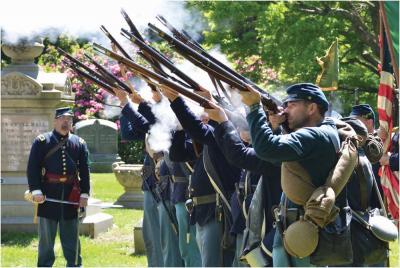May 25, 2017
 Capt. Benjamin Stone, Jr. statue at Grand Army of the Republic burial plot in Cedar Grove Cemetery
Capt. Benjamin Stone, Jr. statue at Grand Army of the Republic burial plot in Cedar Grove Cemetery
On Monday, a small group of Dorchester war veterans and their families will gather around a granite statue that has stood as a silent sentinel inside this burial ground since the late 1860s.
The statue is meant to depict Captain Benjamin Stone, Jr., who led a band of his Dorchester neighbors into battle in the War of the Rebellion, 1861-1865. Stone was one of 97 Dorchester men who did not return home alive. In a town that was then home to just 2,000 residents, 97 men lost was a heavy toll indeed.
Ben Stone was a citizen-soldier who answered President Lincoln’s call for volunteers and joined the 11th Massachusetts Regiment. Like most men in the Union ranks, he was not bred to be a foot soldier or artilleryman. In fact, he was a music engraver and painter by trade.
Nonetheless, Stone’s neighbors no doubt saw something special in him when they elected him to lead them into war before the First Battle of Bull Run in July 1861. A little more than a year later, Stone and his men were badly mauled — along with much of the Union army — in the Second Battle of Bull Run.
Stone was mortally wounded on that August day in 1862 and died some days later in nearby Washington D.C. He was 44 years old and left behind a widow, Ursula, and their young daughter, Sarah. He was buried in the North Burial Ground in Uphams Corner, where he rests today.
After the war, the local Grand Army of the Republic post, a fraternal organization of Civil War veterans, was named after him. The post was located on Park Street in Fields Corner and Union vets would march from there in large columns to Cedar Grove Cemetery where many of their war dead were interred in 1868. More comrades who survived the war would join them later in the plot beneath the statue to Capt. Stone.
Every year since 1868— with a few exceptions for poor weather, such as 2016— the men and women who have followed Stone in defending the United States have gathered around his statue on the last Monday in May. It is a brief, but solemn ritual that typically ends with a volley fired from a contingent of men clad in Union blues representing a Massachusetts volunteer regiment.
 Memorial Day 2014: Members of the Irish 28th MA Volunteers fired their weapons during a salute at last year’s Memorial Day observances in Cedar Grove Cemetery. Chris Lovett photo
Memorial Day 2014: Members of the Irish 28th MA Volunteers fired their weapons during a salute at last year’s Memorial Day observances in Cedar Grove Cemetery. Chris Lovett photo
It’s a small part of a larger ceremony that draws hundreds of neighbors to the cemetery each year for speeches and a call of the roll of older veterans from Dorchester posts who have passed on in the last year.
In New Orleans last week, four statues dedicated to the Confederacy and Confederate leaders long dead were dismantled and carted away. One of those statues memorialized Gen. P.G.T. Beauregard, who commanded the secessionist forces that Ben Stone and his Dorchester friends faced off against in Virginia in ’61. Another represented Robert E. Lee, the former US Army general who resigned his post and threw in with the Confederate forces when Virginia left the Union. Lee commanded the field when Capt. Stone and countless other Dorchester men were struck down near Manassas, VA.
In an address delivered after the final statue was removed, New Orleans Mayor Mitch Landrieu explained brilliantly why the Confederate cause was never worthy of such adoration:
“The Confederacy was on the wrong side of history and humanity,” said Landrieu, a native Louisianan. “It sought to tear apart our nation and subjugate our fellow Americans to slavery. This is the history we should never forget and one that we should never again put on a pedestal to be revered.”
Amen! It’s one thing to embrace the great ideal that Lincoln so eloquently envisioned in his Second Inaugural address— “With malice toward none, with charity for all…” It’s quite another to mythologize and attach hero status to men who conspired toward treason with an explicit motive to expand slavery and its wickedness to new lands.
We should remember their names with scorn, not admiration.
Capt. Stone and his fellow citizen soldiers from Dorchester who marched thousands of miles to preserve the Union and, ultimately, to halt and destroy the evil institution of slavery, are men who should be remembered fondly. It is a point of great pride for the people who call Dorchester home today that we continue to honor their sacrifice.
Villages:
Topics:


